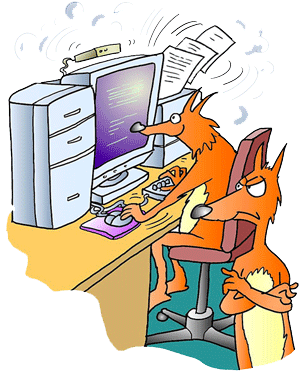Make Sure It’s What You Want
 First, let me just say that no matter what you do, you must love it. If you don’t LOVE writing with all your heart, you’ll be unhappy doing it. Find what you love to do, not what you think is cool. Every career in every industry takes years of skill-building and experience. It doesn’t happen overnight. You have to be dedicated and patient.
First, let me just say that no matter what you do, you must love it. If you don’t LOVE writing with all your heart, you’ll be unhappy doing it. Find what you love to do, not what you think is cool. Every career in every industry takes years of skill-building and experience. It doesn’t happen overnight. You have to be dedicated and patient.
Writers especially must be patient. The life of a writer is not glamorous, but it is very rewarding.
Professional writers:
- spend a lot of time alone
- must love to do research
- must love to read
- must be grammar and punctuation Nazis.
- have to write for free or little pay in the beginning.
- must learn how to collaborate if they want to work on games.
- must develop a thick skin, because someone is always critiquing your work and that person is often right. You will grow more, as a professional writer, from your critiques than you ever will from the praise you receive.
- view their writing as a learning process until the day they take their last breath. Your writing will always be evolving and improving. It is never perfect and never will be. Not until after you’re dead, and then your descendants can reap the benefits of Ebay sales.
If any of the above turns you off, then you may want to consider another career.
Steps to Becoming a Professional Writer (in any industry)
- Know the Chicago Manual of Style from cover to cover. Hone your grammar and punctuation skills to the bone!
- Write, write, write, and not just blather. Practice writing in active voice, with correct punctuation and grammar. Practice playing with words. Words are your friend and the tools of your trade. You have to learn to control them. Creativity and imagination is NOT enough.
- Know your industry. If you want to write in the games industry, read everything you can about how others do it, what’s important to game design, how game design is changing, and who’s doing it. This year, game design is a lot more focused on storytelling, for example, than it has been in the past. There are articles out there talking about how to write good story for a computer game. Find them and read them.
- If you want to write for games, then become as much of a gamer as you can. Play everything you can get your hands on. Read all the gamer e-zines, websites and paper magazines. Start writing articles for them and start getting to know the people who are the movers and shakers in the industry.
- Join professional organizations. There are many organizations out there dedicated to gaming and writing. Find them and choose your favorites. Join. GAMA is one good one.
- Volunteer. You can volunteer by writing articles for gaming magazines. You can volunteer for organizations such as GAMA. You can volunteer to help out at your local gaming convention. It all counts toward linking you into the gaming community.
- Get a professional webpage. Not your livejournal, but a website where you highlight your writing and publications. You can write about games there, but don’t talk about how your girlfriend just broke up with you there. That’s what your livejournal is for.
- Learn HTML. Any writer will benefit from knowing how to create a webpage. It’s not hard. Canvas your friends. I’m sure one of them would be willing to show you the ropes.
- Begin connecting with people in your targeted industry on social networking sites. Facebook and Twitter are the best. You’ll begin seeing links to interesting articles and your knowledge of how the industry works will grow.
- Support the people who have already made it. Interview them for your site. Mention their successes on your Twitter. Etc. For one thing, you’re building good karma. For another, you’re building connections.
- Don’t expect your first real day job in the industry to be as a writer at a game company. It’s unlikely. The competition is tight, and you have to have proven yourself first. Most people break into the games industry by being QA testers first. Or, your first writing job may be for a small dot-com, writing web content about hemorrhoid cream. It’s still a writing gig, and one that goes on your resume to show that you can write professionally. These credits add up over the years.
- Moonlighting is encouraged. When you’re not at your day job, keep writing. Write freelance, if you can. If not, write fiction or articles for magazines. If you can’t write, edit. Writing and editing go hand in hand. Every freelance editing job on your resume is another mark that shows you know words and writing.
- Go to conventions in your chosen industry. If that’s games, then you’re in luck. There are tons and tons of conventions every year that deal with games. Go to them. Take business cards. Meet people and hand out your cards. Make sure the URL for your website is on your business cards, so people can look you up after the con and see just how interesting you are.
- If you find you have a burgeoning relationship with a publisher, work it. Build that relationship. As they grow to trust you, they will give you more assignments and more important assignments.
- Always, always, always behave professionally. Your future employer is not looking for gamer goob who just thinks it would be full of awesome to write games WHAT WHAT! They’re looking for a professional they can rely on, who will:
- always meet deadlines (know your limits; don’t take on more than you can handle; the deadline is sacrosanct)
- always come in right at word count (don’t go over the limit thinking your stuff is too sweet to cut and don’t come in under thinking they can cut a few pages)
- present a professional front if interacting with the public (dress and behavior both)
- treat them as your customer (your boss is your customer)
- never burn a bridge, not matter how much your employer/publisher pisses you off, don’t burn that bridge. Be professional. That person(s) may have your future in her hands one day.
How I Did It
I took a fairly standard route. My first publications were reviews I wrote for free that were published in a tabletop roleplaying game magazine. I was the Shadowrun reviewer for White Wolf magazine. I read all the Shadowrun books that came out and wrote reviews of them.
After that, I did a couple magazine articles also for White Wolf. Then, I started freelancing. I stuck close to White Wolf and developed a relationship with them. Most of my publications were through them, though I also wrote for other companies.
Did I mention that the most important thing you can do is build entries on your publication list. That’s how future employers judge you.
At first, I had to write for free, but once I had credits to my name, I became marketable and started getting paying gigs. For awhile, I didn’t make much at all, but as I built my reputation, I started getting higher paying gigs. Eventually, I was hired full-time for a company, doing writing for them.
I’ve always worked in the games industry, as that’s my field of interest. My knowledge has grown over the years. It’s like building a house. If you’re flaky and flip from industry to industry, then you’re building a bunch of little out-buildings instead of a giant mansion.
In 2001, I transitioned from writing for tabletop roleplaying games into writing for computer games. Even this rather natural transition came with its challenges. I had to go back to writing tips articles and reviews, although this time I wasn’t doing it freelance, I was a contracted employee at Microsoft Game Studios.
It took me another six years before I was hired to write actual in-game content (lore, dialogue, and characters). That’s where I am today.
How Great is Being a Professional Writer
First the bad news. Writing is a hard job. It requires constant focus, and a lot of alone time, a lot of ass-in-chair time. You’ll wear down your fingers typing. In addition, writers make small salaries compared to many other professionals, and it takes years of hard work to build up to that small salary.
Now the good news. If you love writing, and you love your industry (games, for me), then there is nothing more fulfilling than creating characters and stories to be shared with hundreds of thousands of people. Writing is its own greatest reward. Command of the English language mixed with imagination makes a volatile cocktail. It’s addicting, and it’s a labor of love. Your readers return the love you put into it many times over.
My Final Bit of Advice
Most important of all: never doubt that you are a writer. Always say, “I’m a writer,” with confidence. If you don’t believe it, no one else will either.
I wish you all your dreams come true!










